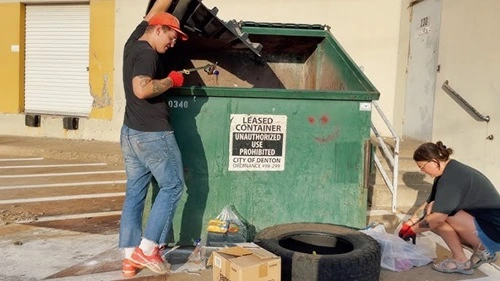No, dumpster diving is not inherently illegal in Nevada. However, the legality depends on specific circumstances such as location, property rights, and local ordinances. While dumpster diving itself is not explicitly prohibited under state law, engaging in the practice can result in legal consequences if it involves trespassing, theft, or violating health and safety regulations.
The Legal Framework for Dumpster Diving in Nevada
1. Supreme Court Ruling: California v. Greenwood
The U.S. Supreme Court ruled in California v. Greenwood (1988) that trash left outside for collection is not protected under the Fourth Amendment, as it is considered abandoned property. This ruling applies nationwide, including Nevada, meaning that once items are discarded, they generally lose privacy protection.
2. Trespassing Laws
- In Nevada, trespassing is illegal under Nevada Revised Statutes (NRS) 207.200.
- Dumpster diving becomes illegal if the dumpster is located on private property with “No Trespassing” signs or if the diver enters a restricted area without permission.
3. Theft Laws
- While discarded items are typically no longer the property of the original owner, taking items from locked or secured dumpsters can be considered theft.
- Using tools to break locks or bypass security measures to access dumpsters could lead to criminal charges.
4. Local Ordinances
Cities and municipalities in Nevada may impose additional restrictions on dumpster diving. For example, Las Vegas and Reno have ordinances addressing waste disposal and unauthorized access to trash receptacles. Violating these ordinances can result in fines or other penalties.
5. Health and Safety Regulations
Dumpster diving may run afoul of public health regulations, especially if it involves hazardous materials, medical waste, or other potentially unsafe items.
Cities in Nevada and Dumpster Diving Rules
1. Las Vegas: Las Vegas enforces strict waste management policies. While dumpster diving is not explicitly illegal, accessing commercial or residential dumpsters on private property without permission may be treated as trespassing.
2. Reno: Reno’s municipal code requires businesses and residents to secure dumpsters and dispose of waste properly. Diving in locked or fenced dumpsters can lead to trespassing or tampering charges.
3. Henderson: In Henderson, diving on private property without permission can lead to legal consequences. Publicly accessible dumpsters without signs are less likely to result in violations.
Penalties for Illegal Dumpster Diving in Nevada
1. Trespassing
- First-time offenders may face fines or misdemeanor charges.
- Repeat offenders or those causing property damage can face harsher penalties, including jail time.
2. Theft or Vandalism
- Charges depend on the value of the items taken or damage caused.
- Penalties can range from minor infractions to felony charges for significant theft or property damage.
3. Fines and Warnings
Local ordinances often impose fines for unauthorized access to waste containers, with amounts varying by municipality.
Tips for Legal Dumpster Diving in Nevada
1. Avoid Private Property: Only dive in publicly accessible dumpsters. Do not enter fenced, locked, or clearly marked areas.
2. Look for Signs: Respect “No Trespassing” or “No Dumping” signs. These indicate areas where access is restricted.
3. Know Local Laws: Familiarize yourself with municipal codes and waste disposal regulations in your city.
4. Be Respectful: Avoid creating a mess or interfering with business operations. Clean up any trash displaced during your activity.
5. Stay Safe: Wear gloves and protective clothing to minimize exposure to hazardous materials.
Related FAQs
Q1. Can I dumpster dive at retail stores in Nevada?
Ans: It depends. If the dumpster is on private property or behind locked gates, diving may result in trespassing charges. Publicly accessible dumpsters are less likely to pose legal issues.
Q2. What happens if I am caught dumpster diving?
Ans: Depending on the circumstances, you may receive a warning, fine, or trespassing citation. Repeat offenses or damage to property could lead to more severe penalties.
Q3. Is dumpster diving considered theft in Nevada?
Ans: Generally, discarded items are no longer considered personal property. However, taking items from secured or locked dumpsters can be classified as theft.
Q4. Are there places where dumpster diving is always illegal?
Ans: Yes, areas with “No Trespassing” signs, locked dumpsters, or restricted zones are off-limits and may result in legal consequences if accessed.
Q5. Can I sell items found while dumpster diving?
Ans: Yes, if the items are legally obtained. However, ensure the items are clean and safe to use, especially if selling food or consumables.
Conclusion
Dumpster diving in Nevada is not outright illegal, but it is heavily regulated by state trespassing laws, local ordinances, and health regulations. Divers must exercise caution and respect property rights to avoid legal consequences. Knowing the rules in your area, avoiding private property, and following safety protocols can help ensure that your activity is both lawful and safe.

